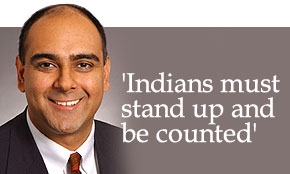
|
|
|

|
| HOME | NEWS | INTERVIEW | ||
|
December 30, 2002 NEWSLINKS |
The Rediff Interview/ Minnesota Senator Satveer Chaudhary

Satveer Chaudhary is the second Indian American to be elected to a state Senate in the United States. The Minnesota state senator's family hailed from Rohtak in Haryana before they migrated to the United States. After having visited India several times this past decade, this winter's three week trip bore a special mission for Chaudhary who was re-elected senator in November. "I want to build a bridge between Minnesota and Haryana, two places that have a great relevance in my life," he told Chief Correspondent Onkar Singh in an exclusive interview. Is it true you want to build a bridge between Minnesota and Rohtak? I want to build some kind of connection between Haryana and Minnesota. Both are agricultural states and have vast potential to make giant strides in almost all spheres of life. I want to have some kind of Haryana connection back in Minnesota. Maybe we can have a twin states or sister states relationship. The two states can have common meeting ground, in education, agricultural, politics and the economy. What can you do for Haryana? I had good meetings with Haryana Chief Minister Om Parkash Chautala. I visited my father's village in Meerut in Uttar Pradesh. I visited the Maharishi Dayanand University in Haryana. I am satisfied with the discussions I had with political leaders and businessmen in Haryana. I hope we will continue to have good rapport in future as well. Haryana is slowly coming up on the Indian industrial scene. I feel businessmen from Minnesota could do something in this matter. We have good food processing capabilities we could offer Haryana. But before that India would have to take stringent measures to improve the environment in the country. It is heartening to note that CNG is being used as replacement fuel for petrol. This would help bring down the level of pollution in India, particularly in Delhi. Have you identified any area of likely cooperation? I am here to make friends and take stock. I want to see what kind of connections one can have in India which could be exploited by both states. You visited a number of locations during your stay. What response did you get from people? All those who I had the opportunity to meet have been very kind to me. Their response was overwhelming. They were pleased to know that one of their own has been elected to office in the United States. Regardless of the mutual benefit, a lot of pride was expressed by people. I am grateful for this kind gesture. Wherever I went -- whether it was Uttar Pradesh, Haryana or elsewhere -- I got a warm welcome from my fellow Indians. What kind of turmoil have Indians in the United States experienced since 9/11? There has been blatant discrimination against people of South Asian origin since September 11, 2001, irrespective of whether they are Muslim, Hindu or Sikh. It is important now, more then ever, that Indians no matter where they are, stand up, be counted and demand their seat at the political table. Sikhs in particular became targets because of the mistaken notion among some Americans that they were linked to Osama bin Laden. What did influential Indian Americans like yourself do to protect them? Two days after the attack on the United States I held a press conference along with members of the Sikh and Muslim communities to announce our solidarity with the rest of America in its hour of crisis. We condemned the attacks on the American people by the fundamentalists, by a few mad people. I was invited on various talks shows to speak on behalf of the Indian community. I was not the only one. There were hundreds and thousands of people from the Asian region who were doing the same. We had to educate Americans about what we stood for. This helped us a great deal. This benefited many minorities in Minnesota because of the efforts of their leadership. The United States wants the world to get together and fight terrorism, but when it comes to fighting cross border terrorism, the Bush Administration looks the other way. I hope that impression changes. The United States certainly does not brush aside terrorism, whether it is against itself or any other country. I have noted statements issued by the State Department about terrorist activities coming from within Pakistan. The United States has built up considerable pressure on Pakistan to do something about those activities. Since India and Pakistan have nuclear capabilities, the United States has to maintain a balance between the two. And it does what it can. Why has the Indian community in the United States failed to project the Indian point of view correctly? I do not agree with the suggestion that it is the job of Indians living in the United States to act as spokespersons for the Indian government. The Government of India has to bridge the relationship between India and United States. It would help a great deal if the Government of India speaks a bit more about what is going on here just as Pakistan and other countries do. It would be nice if Indians in India, right down from Prime Minister Vajpayee, tell the US government about what its views are and the truth about India's perspective.
|
| Tell us what you think of this interview | |
|
HOME | NEWS | CRICKET | MONEY | SPORTS | MOVIES | CHAT | BROADBAND | TRAVEL ASTROLOGY | NEWSLINKS | BOOK SHOP | MUSIC SHOP | GIFT SHOP | HOTEL BOOKINGS AIR/RAIL | WEDDING | ROMANCE | WEATHER | WOMEN | E-CARDS | SEARCH HOMEPAGES | FREE MESSENGER | FREE EMAIL | CONTESTS | FEEDBACK |
|